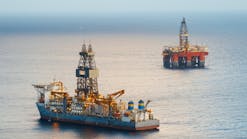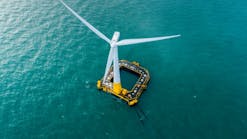French offshore sector stands firm in recession, maintains R&D commitments
Jeremy Beckman - Editor, Europe
Despite the general economic slowdown, France’s oil and gas service sector remains in good shape – for the time being, at least.
Jean Ropers.
Photos courtesy of Alain Simoneau, Le Marin’.
“The process of contraction has started in Houston and Louisiana, with thousands of job losses, but we have seen nothing like that in France so far,” says Jean Ropers, president of the French suppliers association GEP. “As for R&D, companies and institutes such as IFP and Ifremer established their budgets for 2009 during the second part of last year, and I have not heard of any cutbacks.
“Obviously, our members are anxious about the future beyond 2009 – if the financial crisis lasts too long, there could be problems. But some of our companies are also involved in the nuclear business, where prospects are brighter, and because of that they do not feel so much pressure.”
In times like these, he adds, “the role of associations like GEP is even more important than in the past, when there was no crisis. Now is not the right time to cut back on our activities – if we want to stay fit through to when the crisis is past, we have to be proactive.”
Ropers began a three-year term as president of the association on Jan. 1. He spent most of his career in Total’s Exploration/Production branch before retiring in 2004. Later he presided over the French E&P (including offshore) R&D initiatives, CEP&M and Citeph, also serving as GEP’s vice-president in 2007.
Gerard Momplot. Photos courtesy of Alain Simoneau, Le Marin’.
Membership of GEP is open to French-owned oil companies, contractors, suppliers, and service groups, and to divisions of foreign companies based in France. Commitment remains strong, with the number of members rising from 150 a year ago to nearly 170 now, with more expected to join. “The new intake includes small companies probably interested in Citeph,” says GEP’s CEO Gerard Momplot, “and some from other industries looking to do business in the oil and gas sector.
“It’s very important for GEP to develop networking among its members, particularly in the current crisis. We do this by organizing technical meetings and presentations, mainly close to our headquarters in Paris or during exhibitions where we have French pavilions.”
One regular GEP event is Hydrocarbon Days, staged in Paris at the end of October. Last year’s theme was developing projects and new technologies, while the focus in 2009 will be more on hydrocarbon production and refining processes.
This year the association is taking display space at nine international exhibitions, including Deep Offshore Technology, in Monaco in November. Others include OTC, where 25 companies have signed up to the French pavilion, MCE Deepwater Development in Copenhagen, Gastech in Abu Dhabi, MIOGE in Moscow, and Offshore Europe in Aberdeen. The agenda at OTC includes a seminar on how to work with US engineering contractors.
In view of the increasing number of conferences and exhibitions throughout the world, GEP wants to concentrate on hydrocarbon producer countries where its members have a chance to do business. Unsurprisingly, companies expenses related to conferences and exhibitions are already suffering from the current crisis.
To help the members in areas outside their mainstream trading sectors, GEP has appointed a task force of specialists covering the Middle East, North Africa, Southeast Asia, and Russia.
“One region we need to work on more is South America,” says Ropers. “I’m talking about all the countries that have oil and gas production. Considering the problems America has had with some of these countries, it could be a good time to try again to penetrate that market, but it’s not easy.” Nevertheless, the French oil industry already is present in Brazil.
In Russia, GEP has developed links with a counterpart organization in Murmansk.
“Several French companies already have offices in Moscow,” Ropers adds, “and these can also act as a bridgehead. We are still working on improvements to our participation in Russia; obviously local contacts are very important, as they are in Africa.”
While France is strongly represented in the eastern Gulf of Guinea through Total, Perenco, and the main oil and gas services companies, the current hot spots for E&P are farther west. With this in mind GEP is collaborating with French Trade Mission in Abidjan to assemble a “mission” to Ghana in the second half of 2009.
A few weeks ago GEP’s Citeph committee invited a third round of bids for technology sponsorship. The Citeph program started in 2007 with the aim to allocate industry sponsorship to promising oil and gas R&D projects. So far around 60 projects have attracted funding, some of which are now in the patent processing phase. As with GEP’s membership, the program is open to French companies or divisions of companies based and with operating R&D in France.
The 10 sponsors comprise most of France’s oil companies and main offshore engineering contractors. According to Momplot, “the sponsors are particularly interested in hearing proposals from companies outside the oil and gas industry, such as aeronautics and the automotive sector, because they want to access new ideas, new ways of thinking.”
Typically, adds Ropers, the oil company sponsors are looking for new solutions for tight gas, high pressure, high temperature, and Arctic operations. “It’s not different from anywhere else in the industry. We know where oil and gas is supposed to be, we’re just trying to help make the finding and extracting more efficient.”
Recruitment is another ongoing concern. Some French contractors such as Geoservices are taking on new personnel in large numbers, but the shortage of skilled personnel remains critical, according to Ropers. “We are fortunate here in France to have IFP School and IFP Training. Now a college in Brittany (Institut Universitaire de Technologie in Lannion) has been established offering specialist diploma courses for the first time for offshore technicians. Acergy, CGGVeritas, Geoservices, and Total are participating in this program.”
Also of note, GDF Suez, Schlumberger, Total, and CGGVeritas, will be sponsors at the 2nd WPC Youth Forum in Paris this fall, designed to attract young people and students into the industry.







